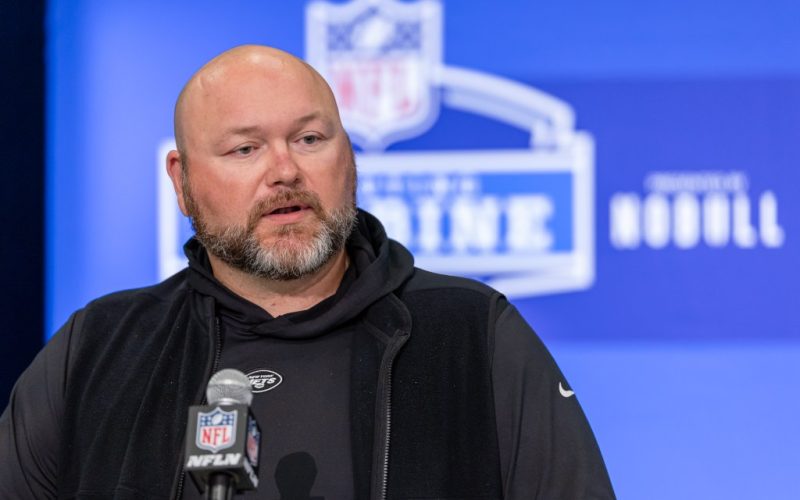Joe Douglas joined the Jets with sky-high hype.
A standout scout for Ozzie Newsome’s Ravens and later an executive with the Super Bowl-winning Eagles, Douglas was hired as the Jets’ general manager in 2019 with the mission of ending the franchise’s decades-long championship drought.
But Douglas’ Jets never came close to meeting expectations.
They suffered through five losing seasons — and no playoff appearances — from 2019-23 and are just 3-8 to begin this one.
Sunday’s 28-27 home loss to the Colts proved to be the final straw. Jets owner Woody Johnson fired Douglas on Tuesday, six weeks to the day that he canned head coach Robert Saleh.
Phil Savage, a senior football advisor since 2019, is set to serve as the interim general manager.
It’s the latest significant shakeup amid another lost year for the Jets, who decided to cut ties with Douglas now rather than wait until the end of the season, when his contract was set to expire.
Here’s how Douglas and the Jets got to this point.
Douglas hired
The Jets’ hiring of Douglas in June 2019 was hailed a home run.
He boasted an impressive track record of identifying talent, having spent 2000-15 helping to build a consistent winner in Baltimore as part of the Ravens’ scouting department.
He was in lockstep with Adam Gase, then the Jets’ newly hired head coach, whom he spent one season with in Chicago as the Bears’ director of college scouting.
And he helped lay the foundation for the Eagles’ 2017 Super Bowl team as Philadelphia’s vice president of player personnel from 2016-19.
Douglas signed a six-year contract to be the Jets’ general manager. He replaced Mike Maccagnan, who had been fired less than a month earlier after famously not aligning with Gase, despite hiring him.
Douglas inherited a roster featuring quarterback Sam Darnold, whom the Jets drafted No. 3 overall in 2018, and defensive tackle Quinnen Williams, whom they took in the same draft slot in 2019.
Early tenure
Douglas’ first two seasons were a mixed bag.
The Jets finished 7-9 in 2019 despite a 1-7 start.
In his first draft as GM, Douglas missed badly on his first two picks, selecting offensive tackle Mekhi Becton in the first round and wide receiver Denzel Mims in the second.
Douglas pulled off a winning trade later in that 2020 offseason, sending star safety Jamal Adams to the Seahawks for a franchise-altering haul of picks that included two first-rounders.
But the 2020 season proved to be Douglas’ worst.
He released a discontent and underperforming Le’Veon Bell just 17 games into the four-year, $52.5 million contract the running back had signed with the previous regime.
Darnold threw nine touchdowns against 11 interceptions, taking a step back in his third NFL season.
The Jets started 0-13, then won back-to-back games, removing them from contention for the first overall pick — which the Jacksonville Jaguars used to select quarterback Trevor Lawrence.
Coaching change
Johnson fired Gase after two seasons, leading to the first head coach opening under Douglas.
With Johnson serving as the U.S. Ambassador to the United Kingdom at the time, Douglas led the search.
He settled on Saleh, a first-time head coach who was in hot demand after a successful run as the 49ers’ defensive coordinator.
Zach Wilson
Continuing that pivotal 2021 offseason was Douglas’ decision to draft Wilson with the No. 2 overall pick to be his franchise quarterback.
Shortly thereafter, Douglas traded Darnold, who went 13-25 as the Jets’ starter, to the Panthers.
This proved to be a defining development in Douglas’ eventual downfall, as Wilson went just 12-21 and was benched three times in his three seasons with the Jets, setting the franchise back once again.
2022 NFL Draft
Douglas’ scouting chops served him well during a 2022 draft that would go down as a highlight in his tumultuous tenure.
He selected cornerback Sauce Gardner with the No. 4 overall pick and wide receiver Garrett Wilson with the No. 10 overall pick, which the Jets had received from Seattle in the Adams trade.
Douglas added pass rusher Jermaine Johnson II with the No. 26 pick and running back Breece Hall at No. 36.
Those picks retooled a Jets roster that suddenly appeared close to contending — if the front office could figure out the quarterback position.
Aaron Rodgers trade
Two seasons into the Wilson experiment, Douglas took the ultimate swing and traded for Rodgers, a four-time NFL MVP entering his age 39 season.
Prognosticators promptly picked the Jets as Super Bowl contenders, believing Rodgers would serve as the missing piece on a roster flush with offensive weapons and defensive talent.
But Rodgers suffered an Achilles tear on the fourth offensive snap of the 2023 season, forcing the Jets to go back to Wilson and, later, to start Tim Boyle and Trevor Siemian at quarterback.
The Jets declined to add a bigger-name quarterback over the course of that season and finished 7-10.
They traded Wilson to the Broncos before the 2024 season in a late-round pick swap, closing the book on Douglas’ most consequential draft choice.
Saleh fired
The Jets entered 2024 with similarly lofty aspirations, hoping a healthy Rodgers could return them to contention.
But the Jets again started slowly, going 2-3 through five weeks, prompting Johnson to fire Saleh.
Johnson said firing Saleh, who finished 20-36 as the Jets’ head coach, was his decision.
“Not going to get into any of the details or the conversations that happened before or after that,” Douglas said this month of the owner’s decision to make a coaching change.
“Woody and I talk every day, but at the end of the day, and I think [former United States Secretary of State] Colin Powell said it in a different arena, but I serve at the pleasure of the owner.”
Douglas fired
Things didn’t get any better for the Jets after Saleh’s sudden ouster.
Sunday’s loss dropped them to 1-5 under interim head coach Jeff Ulbrich.
Rodgers, who turns 41 next month, has passed for 2,442 yards, 17 touchdowns and seven interceptions, but he’s dealt with hamstring and knee injuries, and his mobility in the pocket has appeared compromised.
The defense, expected to be a strength, has struggled, especially to stop the run. The Jets have allowed at least 25 points in four of their last five games.
With Tuesday’s firing, Douglas finished his Jets career with a 30-64 record — and with the team still chasing its first Super Bowl title since 1969.








